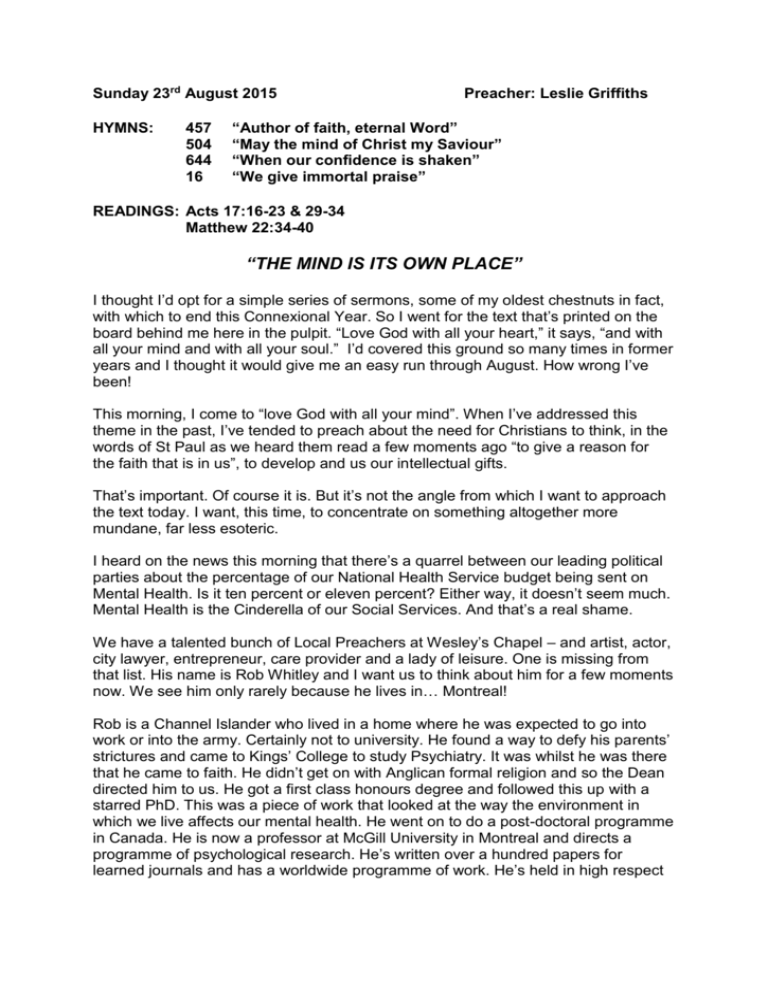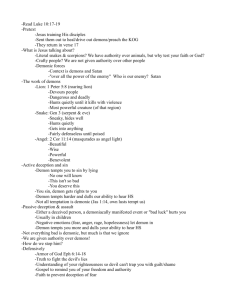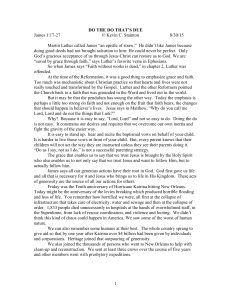Sunday 23rd August
advertisement

Sunday 23rd August 2015 HYMNS: 457 504 644 16 Preacher: Leslie Griffiths “Author of faith, eternal Word” “May the mind of Christ my Saviour” “When our confidence is shaken” “We give immortal praise” READINGS: Acts 17:16-23 & 29-34 Matthew 22:34-40 “THE MIND IS ITS OWN PLACE” I thought I’d opt for a simple series of sermons, some of my oldest chestnuts in fact, with which to end this Connexional Year. So I went for the text that’s printed on the board behind me here in the pulpit. “Love God with all your heart,” it says, “and with all your mind and with all your soul.” I’d covered this ground so many times in former years and I thought it would give me an easy run through August. How wrong I’ve been! This morning, I come to “love God with all your mind”. When I’ve addressed this theme in the past, I’ve tended to preach about the need for Christians to think, in the words of St Paul as we heard them read a few moments ago “to give a reason for the faith that is in us”, to develop and us our intellectual gifts. That’s important. Of course it is. But it’s not the angle from which I want to approach the text today. I want, this time, to concentrate on something altogether more mundane, far less esoteric. I heard on the news this morning that there’s a quarrel between our leading political parties about the percentage of our National Health Service budget being sent on Mental Health. Is it ten percent or eleven percent? Either way, it doesn’t seem much. Mental Health is the Cinderella of our Social Services. And that’s a real shame. We have a talented bunch of Local Preachers at Wesley’s Chapel – and artist, actor, city lawyer, entrepreneur, care provider and a lady of leisure. One is missing from that list. His name is Rob Whitley and I want us to think about him for a few moments now. We see him only rarely because he lives in… Montreal! Rob is a Channel Islander who lived in a home where he was expected to go into work or into the army. Certainly not to university. He found a way to defy his parents’ strictures and came to Kings’ College to study Psychiatry. It was whilst he was there that he came to faith. He didn’t get on with Anglican formal religion and so the Dean directed him to us. He got a first class honours degree and followed this up with a starred PhD. This was a piece of work that looked at the way the environment in which we live affects our mental health. He went on to do a post-doctoral programme in Canada. He is now a professor at McGill University in Montreal and directs a programme of psychological research. He’s written over a hundred papers for learned journals and has a worldwide programme of work. He’s held in high respect by his peers. Let me at this point lift a paragraph that you can all find by typing his name into Google. “His research shows the importance of factors such as gainful employment, secure housing, religion / spirituality, and rewarding social connections in enhancing recovery from severe mental illness. It also shows the devastating impact of stigma. He takes a social justice and human rights approach to his activities… he hopes one day to live in a world where people with mental illness can fulfil their potential and enjoy their full rights as citizens free of fear and stigma.” In other words, Rob Whitley’s work is focussed on enabling people everywhere to “love god with all their mind.” The word “intellect” puts the frighteners on people. But the word “mind” is in common parlance, it’s on everyone’s tongue. To put that suggestion to the test, I’ve kept my ears open over this last week and this is what I’ve come up with… • • • • • • “You can do it if you set your mind on it…” “Come on, make up your mind, …” “Oh, I don’t know, I’m in two minds about this…” “My mind’s not settled yet.” “I’m all at sea, my mind’s all over the place…” “It’s been on my mind for a long time…” All these references are at the level of speech and vocabulary. But our preoccupation of what happens in our mind goes far deeper than that. We all know what it means to have troubled minds. Our smiles are so often intended to keep people’s curiosity at bay. Fear nags away at us. Will our children do well at school? Will our relationships stand the test? Can we afford a new pair of shoes? Worry keeps us awake, twisting and turning through the hours of the night. Guilt stalks the inner chambers of our mind – was I right when I did such and such a thing, could I have done better? Sometimes it’s all too much. We crack. We explode with anger. We resort to violence. We sink into depression. Despair engulfs us. If any of this is true, then we must ask the question with either greater insistence: how are we supposed love God with all our minds? An important tool to help us answer this question would be the Gospels. Read them and see. When you do so, concentrate on Jesus’’ healing ministry but don’t restrict yourself merely to those acts of physical healing which he deployed. We know that those who had been blind had been given their sight, that the deaf could hear again, dumb spoke. We remember how a woman’s haemorrhaging stopped, how a withered arm was made whole, how the hungry were fed, how a leper’s disease was cured. We know all this but we must go beyond all this. We should also note the attention given by Jesus to mental illness. When he says to a paralytic, “get up, take up your bed, walk. Your faith has made has made you whole,” he’s not merely offering a capacity to walk to the sick man. Again and again, we hear references to the casting out of demons. In our Western, postEnlightenment culture we scratch our heads by this reference to “demons”. And yet what better word describes the forces that tear some people apart, the uncontrollable urges that roar through their whole being? Jesus sent his disciples out not only to preach the word but also to cast out demons. And notice the way he gave people confidence to approach him. Whatever hesitations they had, however they were thought of by their peers, he drew them in and gave them his closest attention. He not only cured the leper of his leprosy but, by touching him, he gave him his life back again. And then there’s the classic example, the moment when Jesus met Legion in a graveyard. Here was a man who was subject to demons alright. And Jesus cast them out. A man who inflicted so much self-harm on himself was calmed down. A psychotic riven by schizophrenia, was made whole again. A wreck was given back his dignity. When his disciples returned, to their amazement, they found Legion “clothed and in his right mind.” The injunction that we are to love God with all our mind takes on an entirely different meaning when faced with these events in the life of Jesus. No ten or eleven percent for him. The mind is integral to the way he approaches people. He sees them whole – made up of all that is produced by the heart and the mind, the soul and the body. And so t’s time for me to own up as to the origin of the words that I’ve used as the title for this sermon. I’ve drawn it from John Milton’s “Paradise Lost”. And the speaker is Satan – he’s rallying their defeated troops who are licking their wounds after suffering a humiliating defeat in a cosmic battle with god. “You can stay here forever if you like,” he declared, “or you can find some way to dig deep, to drag yourselves out of this mess and to ask yourself some serious questions.” Satan saw the need to get his troops out of the sulphurous hole in which they found themselves. And so he concludes his stirring address: “The mind is its own place and in itself Can make a Heaven of Hell, a Hell of Heaven.” No psychiatrist (or decent human being) would go all the way with Satan. His suggestion that his followers pull their socks up, get a grip on themselves, and simply turn their backs on their defeat is a footling approach. But every psychiatrist (and decent human being) knows that, with the engagement of someone’s own mind, miracles can be produced and defeated lives turned around. On Friday we received the visit of thirty Clinical Psychologists and Health Psychologists at the completion of a one hundred mile march they had undertaken for Leicester and from Norfolk. To achieve this, they’d slept rough; they’d called at food banks along the way and they’d visited homeless centres. They wanted to declare the role of psychology not only in setting up one-to-one counselling sessions but also in recognising the breadth of factors that lead to mental illness. They wanted to debrief after their long and exacting pilgrimage. They wanted to laugh and share experiences before they dispersed. They’d intended to do this at a local high-profile institution – which had turned its back on them. So they came to us. This bunch of highly-qualified people wanted to declare the link between social inequality and mental health, to show the effect of anxiety about housing, food security, and poverty in creating despair. They wanted to suggest that no one can commit themselves “with all their mind” to any cause whilst undue concern and anxiety dwells deeply within them. Love God with all your mind – to do that, attention needs to be given not only to the symptoms as they occur in any individual but also to the social conditions which weigh upon and tear at those who display such symptoms. Rob Whitley – dear boy – next time you’re in London you must come and share the fruits of your learning with us. I shall sit at your feet and I know that what you’ll tell us will be, from your professional angle, will be as good as any sermon I’ll ever preach from m











